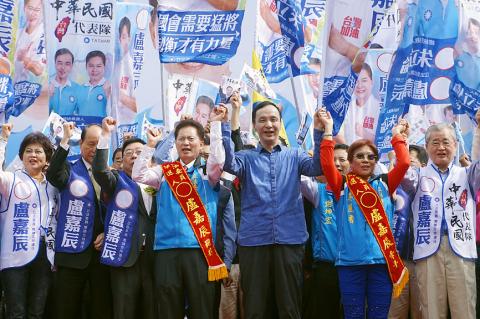Legislative Speaker Wang Jin-pyng’s (王金平) unexpected no-show at a Chinese Nationalist Party (KMT) legislative candidate’s campaign event yesterday has fanned speculation that Wang’s dissatisfaction with the remaining uncertainty over where he is to rank on the party’s list of candidates for at-large legislators has caused tension between him and KMT presidential candidate and Chairman Eric Chu (朱立倫).
Wang has seemed reluctant to campaign for KMT candidates over the past few months, saying that uncertainty over whether he has the right to a fourth term as a legislator-at-large means “he has not been given any title that allows him to do so.”
While the KMT’s Central Standing Committee on Wednesday sought to resolve the issue by passing a motion that exempts KMT legislators-at-large who double as legislative speaker from the party’s self-imposed three-term limit, debates remain within the party on where Wang should rank on the party’s at-large list for the Jan. 16 legislative election.

Photo: Chang An-chiao, Taipei Times
KMT lawmakers siding with Wang have urged the party to offer him the top spot on the list, while some members have accused the KMT of bending rules for a single member and insisted that Wang should be placed 10th.
Wang was scheduled to attend the opening of KMT Legislator Lu Chia-chen’s (盧嘉辰) campaign headquarters in New Taipei City’s Tucheng District (土城) at 10am, 10 minutes after Chu was due to arrive.
The apparent effort to create a sense of party solidarity at the event — which was attended by Premier Mao Chi-kuo (毛治國) and a number of KMT lawmakers — fell apart when Wang announced he would not attend.
It was the second time in two days that Wang has abruptly pulled out of a campaign activity that would have placed him and Chu together, after he failed to appear at an event held by KMT legislative candidate Lin Chiang-chuan (林江釧) in Chiayi County on Saturday.
Dismissing rumors of strained relations, Chu said Wang is and would continue to be the KMT’s top choice of leader of the legislature.
“I believe Wang cares very much for the party’s legislative candidates. Do not worry. Speaker Wang must campaign for them in his own style and at his own pace,” Chu said.
Asked how high Wang would be placed on the KMT’s list of legislator-at-large candidates, Chu said a consensus has been reached among party members, of which Wang is aware.
“Although we still have to respect the nomination evaluation committee’s decisions, our disposition is clear: We would like Wang to be the KMT’s first choice of legislative speaker in the future,” Chu said.
While expressing respect for decisions made by Wang and party headquarters, Lu yesterday urged KMT heavyweights to unite and look at the bigger picture to prevent the party from falling victim to ridicule.
“The party only has hope when its members are united and working to build consensuses,” Lu said.

CHAOS: Iranians took to the streets playing celebratory music after reports of Khamenei’s death on Saturday, while mourners also gathered in Tehran yesterday Iranian Supreme Leader Ayatollah Ali Khamenei was killed in a major attack on Iran launched by Israel and the US, throwing the future of the Islamic republic into doubt and raising the risk of regional instability. Iranian state television and the state-run IRNA news agency announced the 86-year-old’s death early yesterday. US President Donald Trump said it gave Iranians their “greatest chance” to “take back” their country. The announcements came after a joint US and Israeli aerial bombardment that targeted Iranian military and governmental sites. Trump said the “heavy and pinpoint bombing” would continue through the week or as long

TRUST: The KMT said it respected the US’ timing and considerations, and hoped it would continue to honor its commitments to helping Taiwan bolster its defenses and deterrence US President Donald Trump is delaying a multibillion-dollar arms sale to Taiwan to ensure his visit to Beijing is successful, a New York Times report said. The weapons sales package has stalled in the US Department of State, the report said, citing US officials it did not identify. The White House has told agencies not to push forward ahead of Trump’s meeting with Chinese President Xi Jinping (習近平), it said. The two last month held a phone call to discuss trade and geopolitical flashpoints ahead of the summit. Xi raised the Taiwan issue and urged the US to handle arms sales to

State-run CPC Corp, Taiwan (CPC, 台灣中油) yesterday said that it had confirmed on Saturday night with its liquefied natural gas (LNG) and crude oil suppliers that shipments are proceeding as scheduled and that domestic supplies remain unaffected. The CPC yesterday announced the gasoline and diesel prices will rise by NT$0.2 and NT$0.4 per liter, respectively, starting Monday, citing Middle East tensions and blizzards in the eastern United States. CPC also iterated it has been reducing the proportion of crude oil imports from the Middle East and diversifying its supply sources in the past few years in response to geopolitical risks, expanding

Pro-democracy media tycoon Jimmy Lai’s (黎智英) fraud conviction and prison sentence were yesterday overturned by a Hong Kong court, in a surprise legal decision that comes soon after Lai was jailed for 20 years on a separate national security charge. Judges Jeremy Poon (潘兆初), Anthea Pang (彭寶琴) and Derek Pang (彭偉昌) said in the judgement that they allowed the appeal from Lai, and another defendant in the case, to proceed, as a lower court judge had “erred.” “The Court of Appeal gave them leave to appeal against their conviction, allowed their appeals, quashed the convictions and set aside the sentences,” the judges